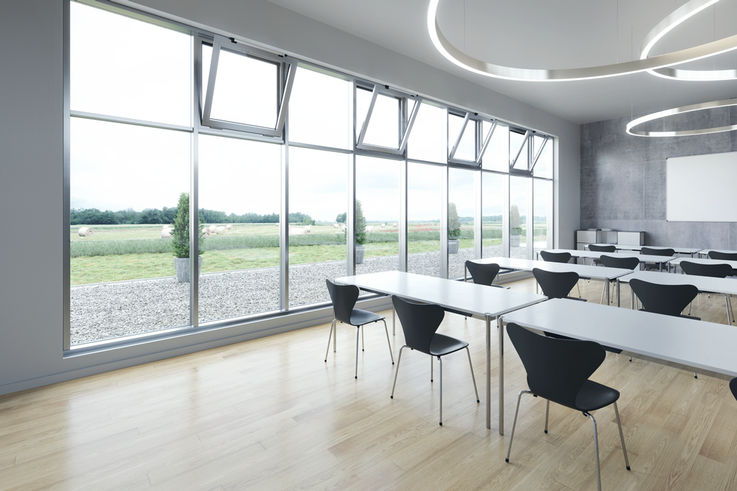Natural ventilation to improve air quality – an interview with Karen Sum
Whether it is for schools or preschools, commercial premises or offices, social distancing, hygiene and face coverings are currently essential. By the same token, reliable natural ventilation is more important than ever. In this interview, Karen Sum, Head of Global Account Management, outlines the methods and approaches we can use to enhance the fresh air supply and improve the air quality in buildings – with minimal effort and little investment.
Why is ventilation such an important topic at the moment?
“Buildings have come under increasing scrutiny in recent years in relation to energy efficiency, and this includes the reduction of heating or cooling costs. The use of modern, energy-saving construction methods means that we work, live and learn in increasingly well-sealed buildings. The major drawback of this, however, is that too little fresh air comes in and too little used air can escape. This creates a need for intelligent ventilation to ensure effective air exchange, thereby improving indoor air quality and hygiene and allowing buildings to be used safely. Researchers suspect that enclosed spaces present an elevated risk of infection through virus-carrying aerosols. Viruses transmitted in this way include both COVID-19 and classic flu viruses. As aerosol particles are smaller and lighter than droplets, they float around in the air for longer and don’t fall to the ground as quickly. This is why efficient air exchange is needed, to reduce the concentration of aerosols in indoor air.”
Natural ventilation is an effective solution to significantly improve indoor air quality. In addition, using automatic window drives for controlled ventilation requires less energy than most mechanical ventilation systems.
Karen Sum, Head of Global Account Management GEZE GmbH
Natural ventilation noticeably improves indoor air quality.
How can we ensure efficient air exchange?
“People often turn to mechanical ventilation systems, but these do not solve the current problems of the coronavirus pandemic. In many cases, the air filters in ventilation systems are not fine enough to filter aerosols – and therefore viruses – out of indoor air. Without effective air exchange, air is simply recirculated; in the worst case scenario, such systems can actually worsen indoor air quality – and thereby increase the risk of people catching the coronavirus. On top of that, there are personal perceptions: most of us soon begin to feel uncomfortable in a room where we can’t open the windows. The alternative to this is controlled, natural ventilation via automated windows. This lets in fresh air from outdoors and prevents stale air from being recirculated around the room.”
Find out more about natural ventilationOpening the window sounds so simple. What factors are important for window ventilation?
“In busy areas such as offices, schools and universities, where people are subject to time pressure and need to concentrate on their work, they often forget to open the window. The problem is made worse by the fact we tend to notice a deterioration in indoor quality when it is already too late. In addition to an increased risk of infection, poor air quality can affect our ability to concentrate and perform and even cause headaches and dizziness. Systems that open windows automatically without needing anyone to actively go to the window are effective solutions. This facilitates efficient air exchange, noticeably improving air quality and reducing the risk of infection.”

Smart window drives are a convenient and effective solution for ventilation.
Do automated windows provide efficient ventilation?
“Natural ventilation is an effective solution to significantly improve indoor air quality. In addition, using automatic window drives for controlled ventilation requires less energy than most mechanical ventilation systems. Building operators also benefit from comparably low investment costs, as automatic window drives represent a cost-efficient retrofitting solution.”
Why are automated windows not used more often to provide natural ventilation?
“Security is very often used as a key argument against installing windows that open – to protect against break-ins on the ground floor and due to safety concerns on upper floors. It is worth considering smaller, hinged casement windows – a safe and effective concept that does not compromise safety or security. It allows windows to be opened and closed with ease, such as to counteract noise disturbance at busier times. You can programme a timer so that windows open and close at specific times.”

The system is convenient to operate using the intuitive display or pre-programmed scenarios.
Why use a timer for ventilation?
“We often tend to be influenced by the temperature, acoustics and visual stimuli rather than air quality. We’re more likely to assess air quality based on smell and general feelings, like ‘I’m a bit too warm’. The longer we spend in a room, the less we notice deteriorating air quality – so we often notice it much too late. Even more troubling is the fact that we tend to breathe in used air that has been circulating around the room.”
Is there a solution to our lack of sensitivity to air quality?
“Yes – examples include timers and easily installable sensors that identify changes in air quality. Smart window drives such as the GEZE Slimchain can be connected with sensors and integrated into building management systems using KNX or BACnet interface modules. Building automation provides convenient, effective and situation-appropriate air circulation.”

Smart and safe ventilation with the GIRA KNX weather station.
Are there further ways to improve indoor air quality using building automation systems?
“Smart sensors can also be combined with other devices such as rain sensors and other weather stations. Automated roof windows can also be integrated in indoor climate regulation systems, thus making a wonderful contribution to day cooling and especially night cooling. Buildings that are ventilated at night as instructed by suitable security and weather sensors provide a pleasant climate at all hours, thereby meeting the requirements of flexible working hours and breaks in the weather around the world.

The Perlan 140 Duosync roller sliding fitting opens and closes double leaf sliding doors synchronously. © GEZE GmbH
Besides air quality, are there any other factors that building operators should bear in mind during the current coronavirus crisis?
“Yes, lots of new occupational health and safety measures need to be put in place due to the coronavirus pandemic. For example, social distancing has dramatically changed office layouts. Open, airy building designs and open-plan offices are now coming into question; people are also often avoiding small meeting rooms. An intelligent division of office space can be an effective way of isolating different sections and the air in them, provided that each section has windows that can be opened. Moveable partition walls and other aesthetic ways of creating separate areas can also improve privacy while offering further ways of dividing ventilated rooms. This also has benefits beyond the current situation, because the acoustic and visual advantages enhance well-being and make buildings more liveable.”



